Financial Reporting: IASB Framework and Concepts Report
VerifiedAdded on 2021/01/01
|7
|1340
|345
Report
AI Summary
This report provides an in-depth overview of financial reporting, focusing on the International Accounting Standards Board (IASB) conceptual framework. It begins by defining financial reporting and its importance in analyzing an organization's performance, highlighting its use by stakeholders like investors and creditors. The report then details the IASB's framework, emphasizing its role in setting accounting standards and ensuring consistency. Key elements like the objectives of financial reporting, fundamental qualities such as relevance and faithful representation, and enhancing qualities like comparability and verifiability are discussed. Furthermore, the report explores essential concepts used in generating financial statements, including recognition, measurement, and disclosure, alongside basic assumptions like the economic entity, going concern, and accrual principle. The conclusion summarizes the importance of adhering to the IASB guidelines for accurate and reliable financial reporting, which is crucial for informed decision-making by stakeholders. The report utilizes academic sources to support its analysis.
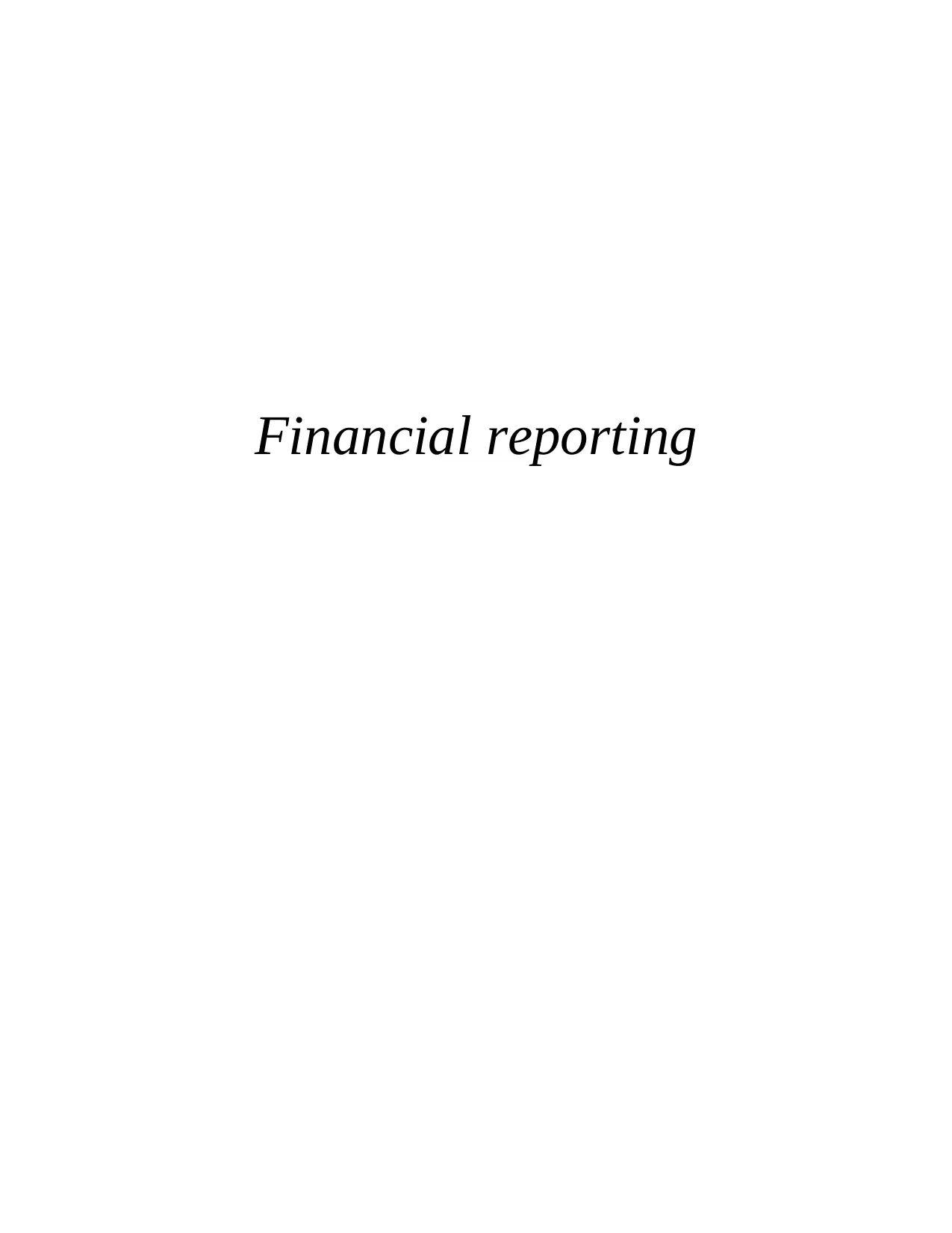
Financial reporting
Paraphrase This Document
Need a fresh take? Get an instant paraphrase of this document with our AI Paraphraser
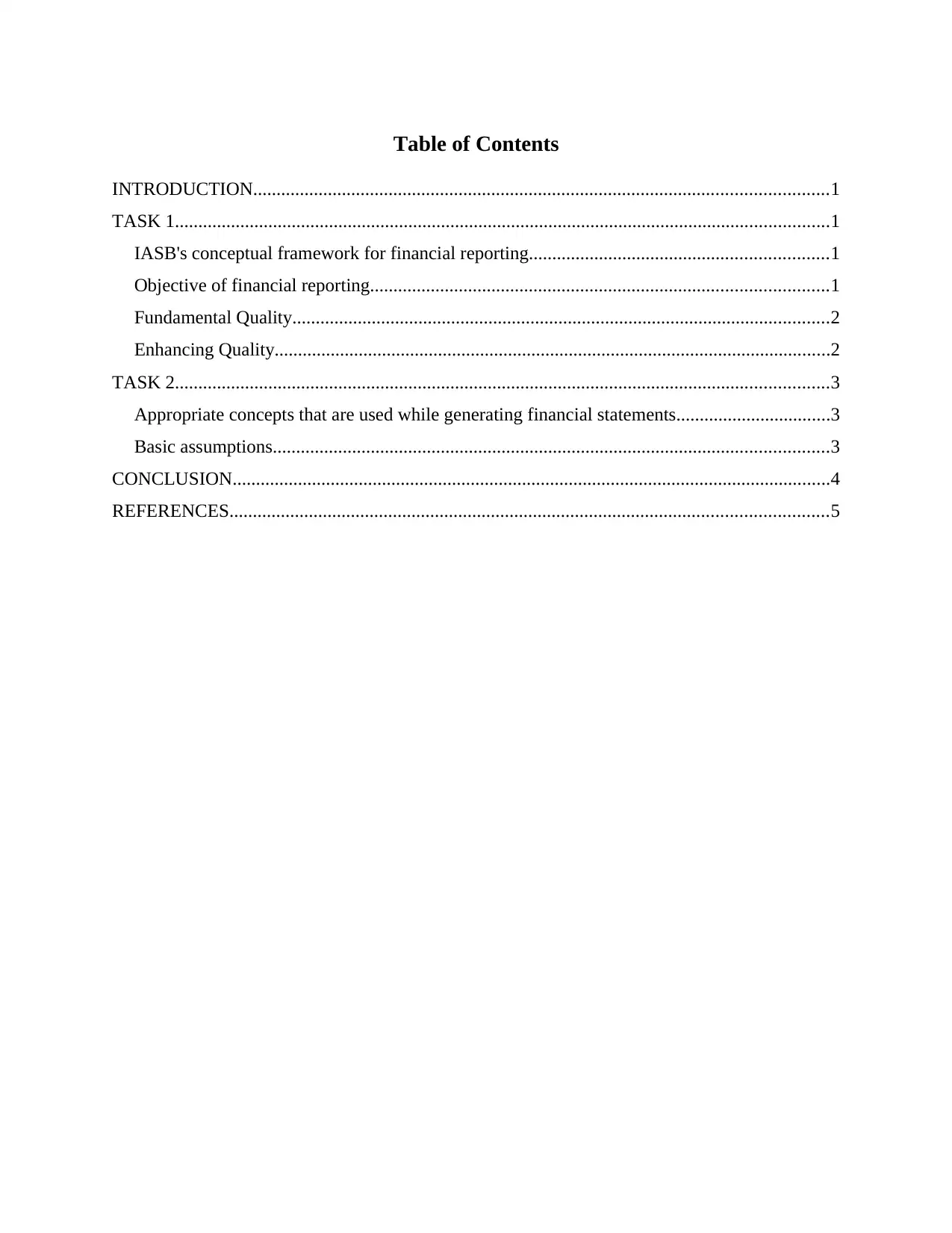
Table of Contents
INTRODUCTION...........................................................................................................................1
TASK 1............................................................................................................................................1
IASB's conceptual framework for financial reporting................................................................1
Objective of financial reporting..................................................................................................1
Fundamental Quality...................................................................................................................2
Enhancing Quality.......................................................................................................................2
TASK 2............................................................................................................................................3
Appropriate concepts that are used while generating financial statements.................................3
Basic assumptions.......................................................................................................................3
CONCLUSION................................................................................................................................4
REFERENCES................................................................................................................................5
INTRODUCTION...........................................................................................................................1
TASK 1............................................................................................................................................1
IASB's conceptual framework for financial reporting................................................................1
Objective of financial reporting..................................................................................................1
Fundamental Quality...................................................................................................................2
Enhancing Quality.......................................................................................................................2
TASK 2............................................................................................................................................3
Appropriate concepts that are used while generating financial statements.................................3
Basic assumptions.......................................................................................................................3
CONCLUSION................................................................................................................................4
REFERENCES................................................................................................................................5
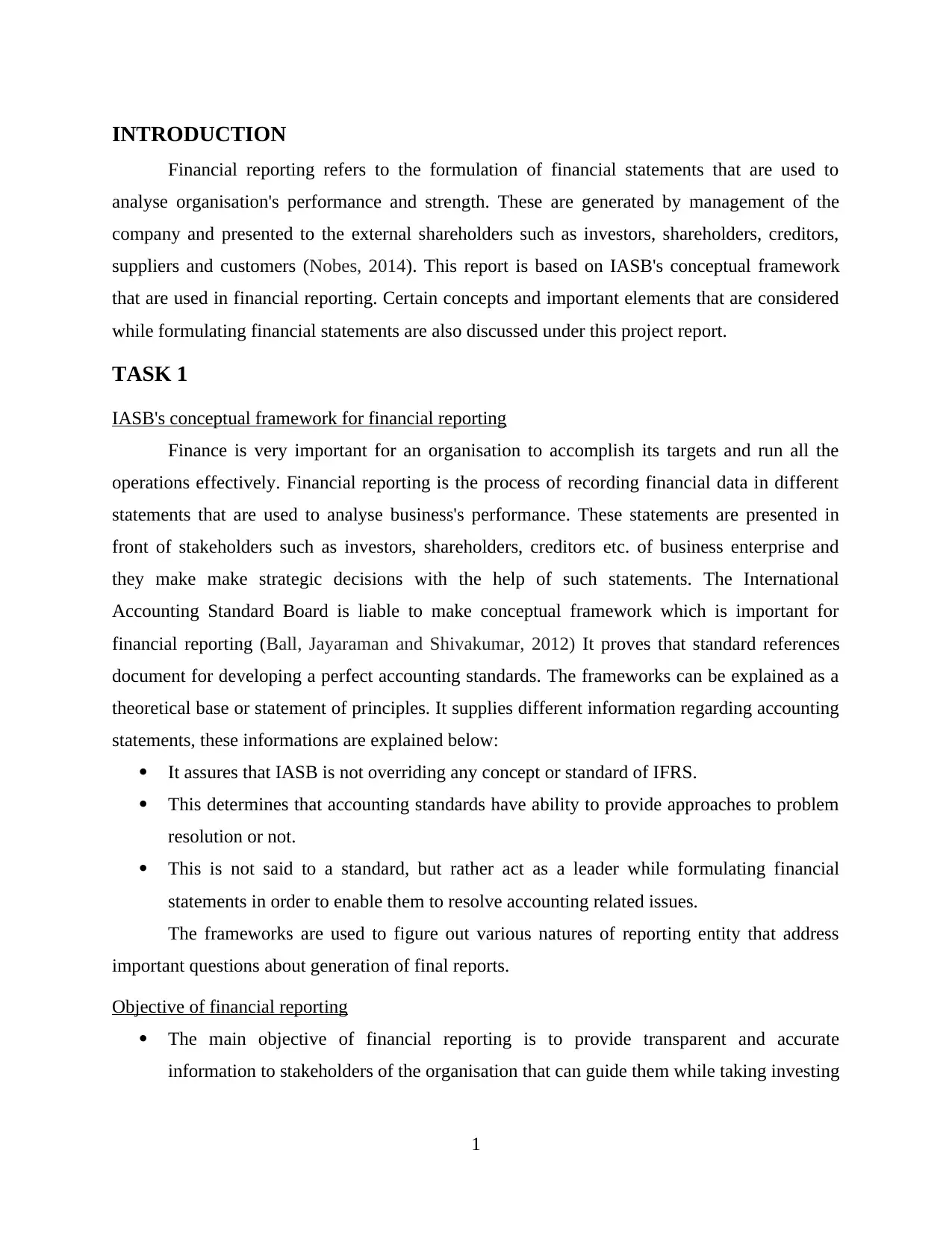
INTRODUCTION
Financial reporting refers to the formulation of financial statements that are used to
analyse organisation's performance and strength. These are generated by management of the
company and presented to the external shareholders such as investors, shareholders, creditors,
suppliers and customers (Nobes, 2014). This report is based on IASB's conceptual framework
that are used in financial reporting. Certain concepts and important elements that are considered
while formulating financial statements are also discussed under this project report.
TASK 1
IASB's conceptual framework for financial reporting
Finance is very important for an organisation to accomplish its targets and run all the
operations effectively. Financial reporting is the process of recording financial data in different
statements that are used to analyse business's performance. These statements are presented in
front of stakeholders such as investors, shareholders, creditors etc. of business enterprise and
they make make strategic decisions with the help of such statements. The International
Accounting Standard Board is liable to make conceptual framework which is important for
financial reporting (Ball, Jayaraman and Shivakumar, 2012) It proves that standard references
document for developing a perfect accounting standards. The frameworks can be explained as a
theoretical base or statement of principles. It supplies different information regarding accounting
statements, these informations are explained below:
It assures that IASB is not overriding any concept or standard of IFRS.
This determines that accounting standards have ability to provide approaches to problem
resolution or not.
This is not said to a standard, but rather act as a leader while formulating financial
statements in order to enable them to resolve accounting related issues.
The frameworks are used to figure out various natures of reporting entity that address
important questions about generation of final reports.
Objective of financial reporting
The main objective of financial reporting is to provide transparent and accurate
information to stakeholders of the organisation that can guide them while taking investing
1
Financial reporting refers to the formulation of financial statements that are used to
analyse organisation's performance and strength. These are generated by management of the
company and presented to the external shareholders such as investors, shareholders, creditors,
suppliers and customers (Nobes, 2014). This report is based on IASB's conceptual framework
that are used in financial reporting. Certain concepts and important elements that are considered
while formulating financial statements are also discussed under this project report.
TASK 1
IASB's conceptual framework for financial reporting
Finance is very important for an organisation to accomplish its targets and run all the
operations effectively. Financial reporting is the process of recording financial data in different
statements that are used to analyse business's performance. These statements are presented in
front of stakeholders such as investors, shareholders, creditors etc. of business enterprise and
they make make strategic decisions with the help of such statements. The International
Accounting Standard Board is liable to make conceptual framework which is important for
financial reporting (Ball, Jayaraman and Shivakumar, 2012) It proves that standard references
document for developing a perfect accounting standards. The frameworks can be explained as a
theoretical base or statement of principles. It supplies different information regarding accounting
statements, these informations are explained below:
It assures that IASB is not overriding any concept or standard of IFRS.
This determines that accounting standards have ability to provide approaches to problem
resolution or not.
This is not said to a standard, but rather act as a leader while formulating financial
statements in order to enable them to resolve accounting related issues.
The frameworks are used to figure out various natures of reporting entity that address
important questions about generation of final reports.
Objective of financial reporting
The main objective of financial reporting is to provide transparent and accurate
information to stakeholders of the organisation that can guide them while taking investing
1
⊘ This is a preview!⊘
Do you want full access?
Subscribe today to unlock all pages.

Trusted by 1+ million students worldwide
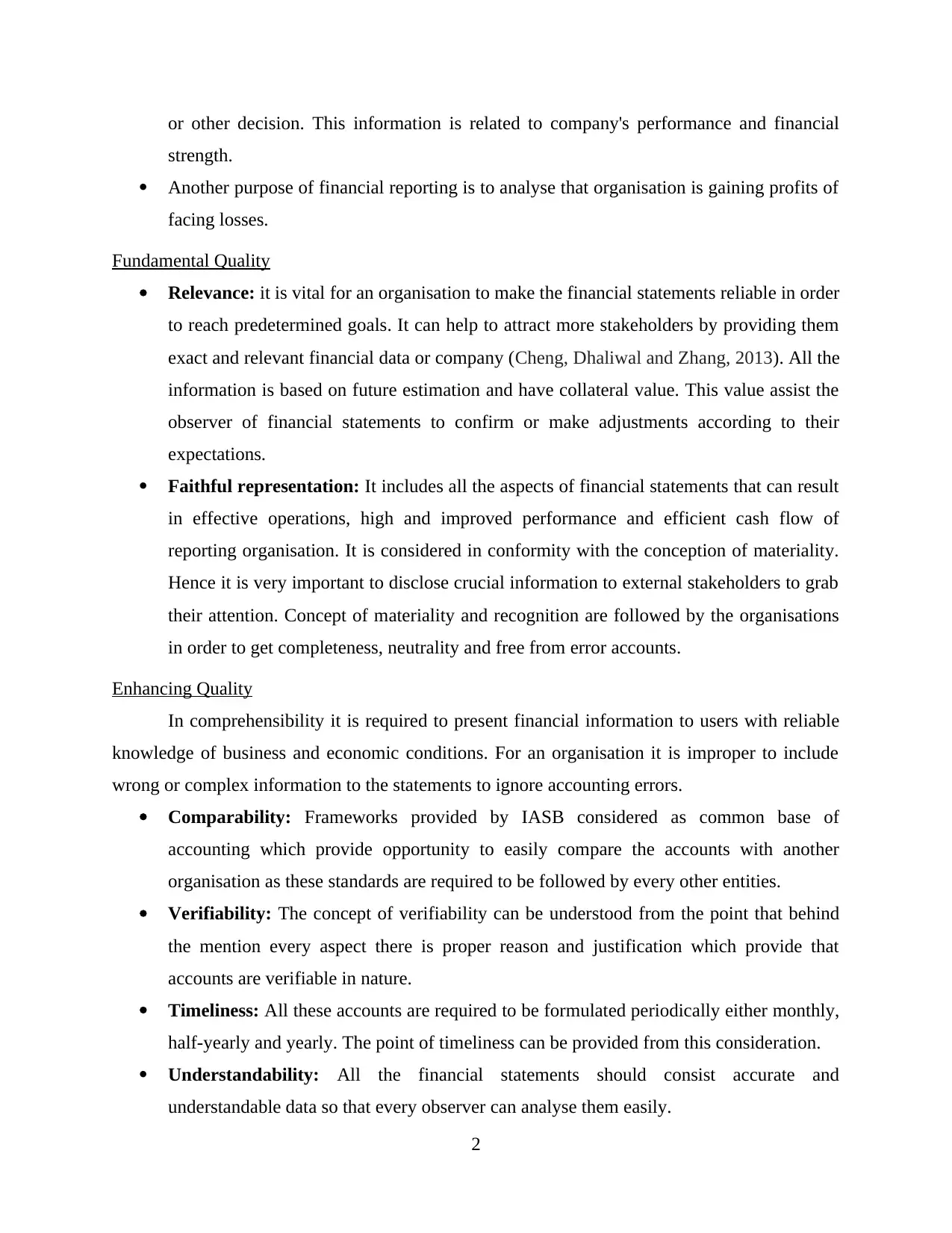
or other decision. This information is related to company's performance and financial
strength.
Another purpose of financial reporting is to analyse that organisation is gaining profits of
facing losses.
Fundamental Quality
Relevance: it is vital for an organisation to make the financial statements reliable in order
to reach predetermined goals. It can help to attract more stakeholders by providing them
exact and relevant financial data or company (Cheng, Dhaliwal and Zhang, 2013). All the
information is based on future estimation and have collateral value. This value assist the
observer of financial statements to confirm or make adjustments according to their
expectations.
Faithful representation: It includes all the aspects of financial statements that can result
in effective operations, high and improved performance and efficient cash flow of
reporting organisation. It is considered in conformity with the conception of materiality.
Hence it is very important to disclose crucial information to external stakeholders to grab
their attention. Concept of materiality and recognition are followed by the organisations
in order to get completeness, neutrality and free from error accounts.
Enhancing Quality
In comprehensibility it is required to present financial information to users with reliable
knowledge of business and economic conditions. For an organisation it is improper to include
wrong or complex information to the statements to ignore accounting errors.
Comparability: Frameworks provided by IASB considered as common base of
accounting which provide opportunity to easily compare the accounts with another
organisation as these standards are required to be followed by every other entities.
Verifiability: The concept of verifiability can be understood from the point that behind
the mention every aspect there is proper reason and justification which provide that
accounts are verifiable in nature.
Timeliness: All these accounts are required to be formulated periodically either monthly,
half-yearly and yearly. The point of timeliness can be provided from this consideration.
Understandability: All the financial statements should consist accurate and
understandable data so that every observer can analyse them easily.
2
strength.
Another purpose of financial reporting is to analyse that organisation is gaining profits of
facing losses.
Fundamental Quality
Relevance: it is vital for an organisation to make the financial statements reliable in order
to reach predetermined goals. It can help to attract more stakeholders by providing them
exact and relevant financial data or company (Cheng, Dhaliwal and Zhang, 2013). All the
information is based on future estimation and have collateral value. This value assist the
observer of financial statements to confirm or make adjustments according to their
expectations.
Faithful representation: It includes all the aspects of financial statements that can result
in effective operations, high and improved performance and efficient cash flow of
reporting organisation. It is considered in conformity with the conception of materiality.
Hence it is very important to disclose crucial information to external stakeholders to grab
their attention. Concept of materiality and recognition are followed by the organisations
in order to get completeness, neutrality and free from error accounts.
Enhancing Quality
In comprehensibility it is required to present financial information to users with reliable
knowledge of business and economic conditions. For an organisation it is improper to include
wrong or complex information to the statements to ignore accounting errors.
Comparability: Frameworks provided by IASB considered as common base of
accounting which provide opportunity to easily compare the accounts with another
organisation as these standards are required to be followed by every other entities.
Verifiability: The concept of verifiability can be understood from the point that behind
the mention every aspect there is proper reason and justification which provide that
accounts are verifiable in nature.
Timeliness: All these accounts are required to be formulated periodically either monthly,
half-yearly and yearly. The point of timeliness can be provided from this consideration.
Understandability: All the financial statements should consist accurate and
understandable data so that every observer can analyse them easily.
2
Paraphrase This Document
Need a fresh take? Get an instant paraphrase of this document with our AI Paraphraser
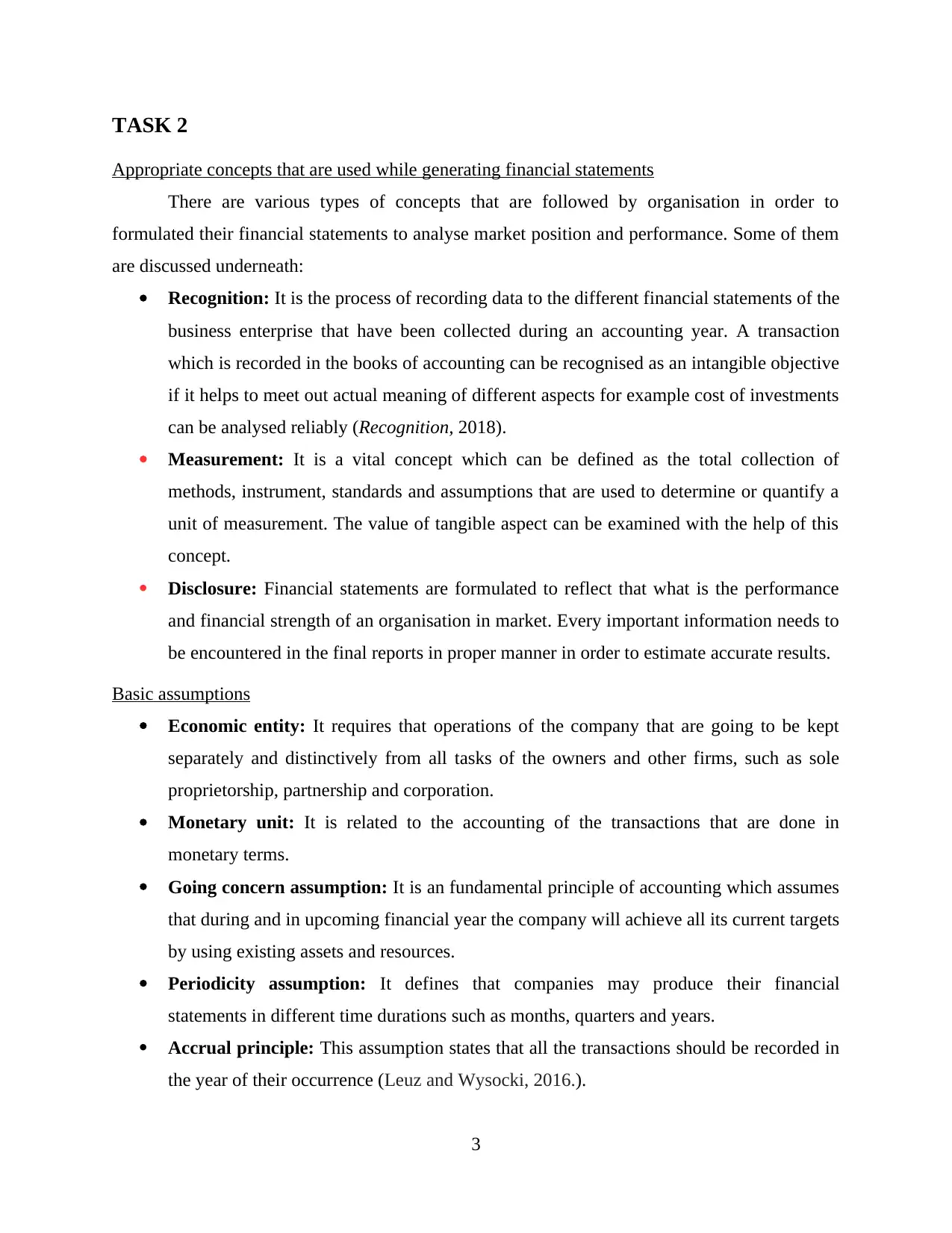
TASK 2
Appropriate concepts that are used while generating financial statements
There are various types of concepts that are followed by organisation in order to
formulated their financial statements to analyse market position and performance. Some of them
are discussed underneath:
Recognition: It is the process of recording data to the different financial statements of the
business enterprise that have been collected during an accounting year. A transaction
which is recorded in the books of accounting can be recognised as an intangible objective
if it helps to meet out actual meaning of different aspects for example cost of investments
can be analysed reliably (Recognition, 2018).
Measurement: It is a vital concept which can be defined as the total collection of
methods, instrument, standards and assumptions that are used to determine or quantify a
unit of measurement. The value of tangible aspect can be examined with the help of this
concept.
Disclosure: Financial statements are formulated to reflect that what is the performance
and financial strength of an organisation in market. Every important information needs to
be encountered in the final reports in proper manner in order to estimate accurate results.
Basic assumptions
Economic entity: It requires that operations of the company that are going to be kept
separately and distinctively from all tasks of the owners and other firms, such as sole
proprietorship, partnership and corporation.
Monetary unit: It is related to the accounting of the transactions that are done in
monetary terms.
Going concern assumption: It is an fundamental principle of accounting which assumes
that during and in upcoming financial year the company will achieve all its current targets
by using existing assets and resources.
Periodicity assumption: It defines that companies may produce their financial
statements in different time durations such as months, quarters and years.
Accrual principle: This assumption states that all the transactions should be recorded in
the year of their occurrence (Leuz and Wysocki, 2016.).
3
Appropriate concepts that are used while generating financial statements
There are various types of concepts that are followed by organisation in order to
formulated their financial statements to analyse market position and performance. Some of them
are discussed underneath:
Recognition: It is the process of recording data to the different financial statements of the
business enterprise that have been collected during an accounting year. A transaction
which is recorded in the books of accounting can be recognised as an intangible objective
if it helps to meet out actual meaning of different aspects for example cost of investments
can be analysed reliably (Recognition, 2018).
Measurement: It is a vital concept which can be defined as the total collection of
methods, instrument, standards and assumptions that are used to determine or quantify a
unit of measurement. The value of tangible aspect can be examined with the help of this
concept.
Disclosure: Financial statements are formulated to reflect that what is the performance
and financial strength of an organisation in market. Every important information needs to
be encountered in the final reports in proper manner in order to estimate accurate results.
Basic assumptions
Economic entity: It requires that operations of the company that are going to be kept
separately and distinctively from all tasks of the owners and other firms, such as sole
proprietorship, partnership and corporation.
Monetary unit: It is related to the accounting of the transactions that are done in
monetary terms.
Going concern assumption: It is an fundamental principle of accounting which assumes
that during and in upcoming financial year the company will achieve all its current targets
by using existing assets and resources.
Periodicity assumption: It defines that companies may produce their financial
statements in different time durations such as months, quarters and years.
Accrual principle: This assumption states that all the transactions should be recorded in
the year of their occurrence (Leuz and Wysocki, 2016.).
3
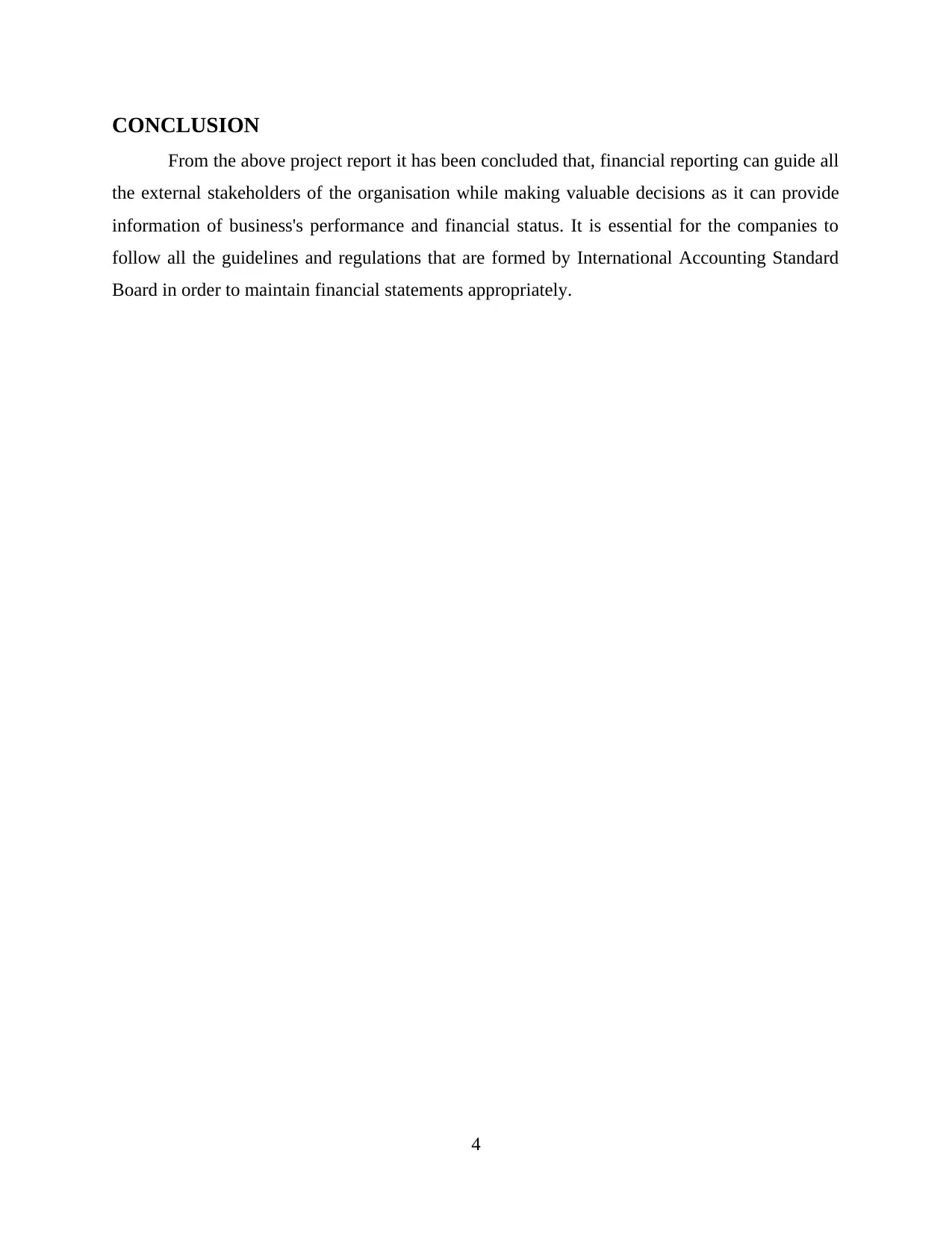
CONCLUSION
From the above project report it has been concluded that, financial reporting can guide all
the external stakeholders of the organisation while making valuable decisions as it can provide
information of business's performance and financial status. It is essential for the companies to
follow all the guidelines and regulations that are formed by International Accounting Standard
Board in order to maintain financial statements appropriately.
4
From the above project report it has been concluded that, financial reporting can guide all
the external stakeholders of the organisation while making valuable decisions as it can provide
information of business's performance and financial status. It is essential for the companies to
follow all the guidelines and regulations that are formed by International Accounting Standard
Board in order to maintain financial statements appropriately.
4
⊘ This is a preview!⊘
Do you want full access?
Subscribe today to unlock all pages.

Trusted by 1+ million students worldwide
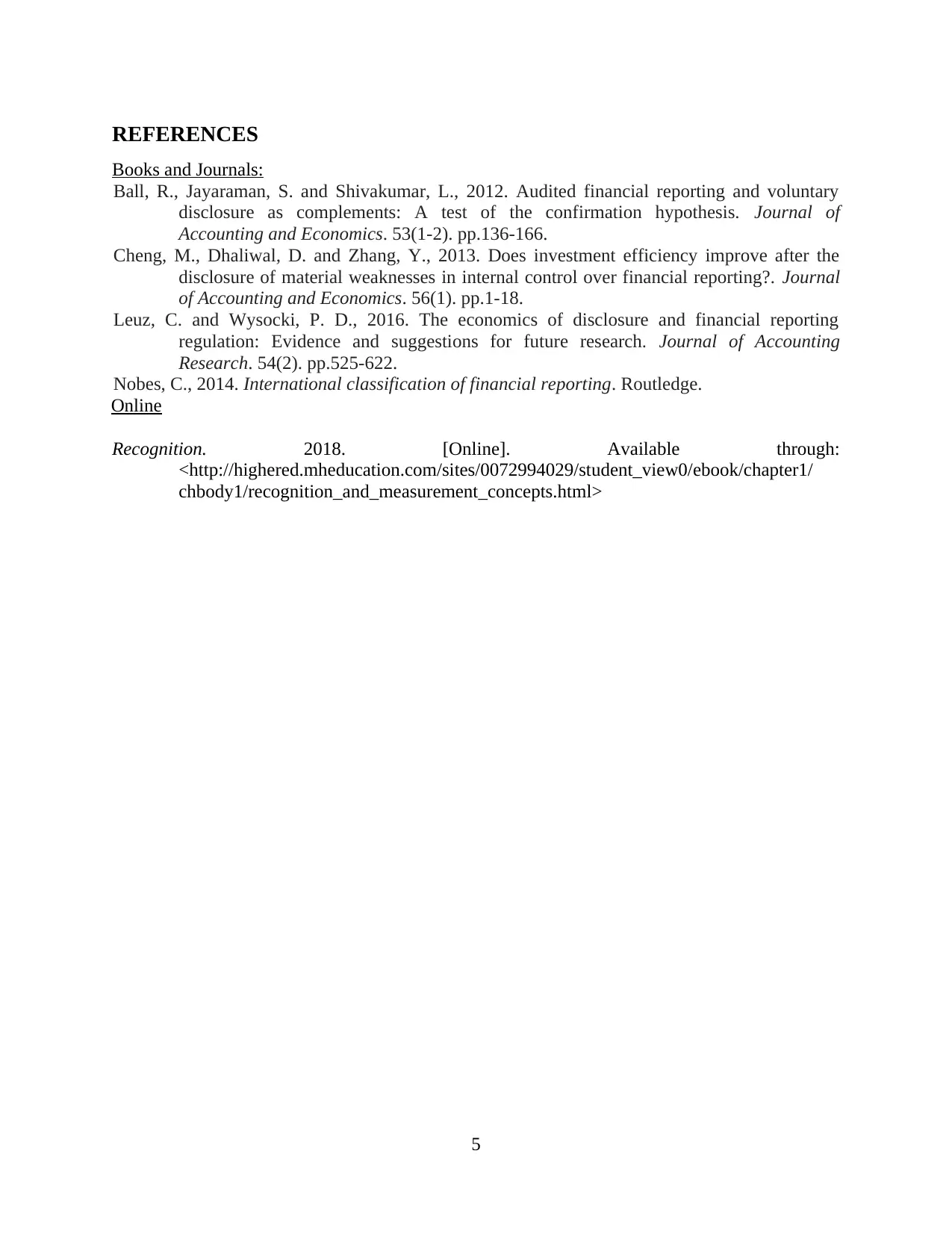
REFERENCES
Books and Journals:
Ball, R., Jayaraman, S. and Shivakumar, L., 2012. Audited financial reporting and voluntary
disclosure as complements: A test of the confirmation hypothesis. Journal of
Accounting and Economics. 53(1-2). pp.136-166.
Cheng, M., Dhaliwal, D. and Zhang, Y., 2013. Does investment efficiency improve after the
disclosure of material weaknesses in internal control over financial reporting?. Journal
of Accounting and Economics. 56(1). pp.1-18.
Leuz, C. and Wysocki, P. D., 2016. The economics of disclosure and financial reporting
regulation: Evidence and suggestions for future research. Journal of Accounting
Research. 54(2). pp.525-622.
Nobes, C., 2014. International classification of financial reporting. Routledge.
Online
Recognition. 2018. [Online]. Available through:
<http://highered.mheducation.com/sites/0072994029/student_view0/ebook/chapter1/
chbody1/recognition_and_measurement_concepts.html>
5
Books and Journals:
Ball, R., Jayaraman, S. and Shivakumar, L., 2012. Audited financial reporting and voluntary
disclosure as complements: A test of the confirmation hypothesis. Journal of
Accounting and Economics. 53(1-2). pp.136-166.
Cheng, M., Dhaliwal, D. and Zhang, Y., 2013. Does investment efficiency improve after the
disclosure of material weaknesses in internal control over financial reporting?. Journal
of Accounting and Economics. 56(1). pp.1-18.
Leuz, C. and Wysocki, P. D., 2016. The economics of disclosure and financial reporting
regulation: Evidence and suggestions for future research. Journal of Accounting
Research. 54(2). pp.525-622.
Nobes, C., 2014. International classification of financial reporting. Routledge.
Online
Recognition. 2018. [Online]. Available through:
<http://highered.mheducation.com/sites/0072994029/student_view0/ebook/chapter1/
chbody1/recognition_and_measurement_concepts.html>
5
1 out of 7
Related Documents
Your All-in-One AI-Powered Toolkit for Academic Success.
+13062052269
info@desklib.com
Available 24*7 on WhatsApp / Email
![[object Object]](/_next/static/media/star-bottom.7253800d.svg)
Unlock your academic potential
Copyright © 2020–2026 A2Z Services. All Rights Reserved. Developed and managed by ZUCOL.




